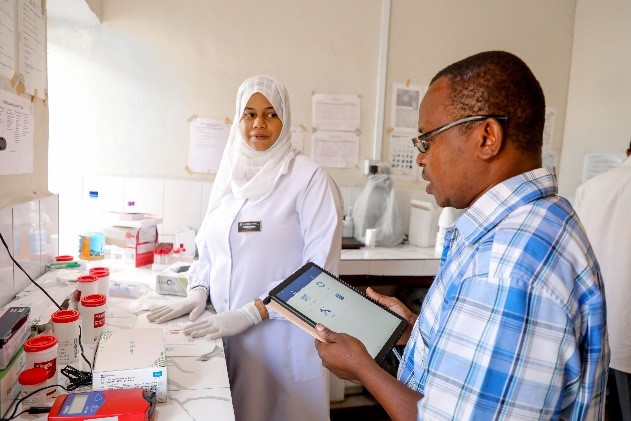Abdallah Hamisi noticed a troubling trend at Raha Leo health center in Zanzibar, where he has been a laboratory technician for nine years. He is responsible for identifying the presence of malaria infection in patient blood samples and providing that information to health care providers so they can decide what treatment to offer to help patients recover quickly. When malaria-related data collection and reporting issues are identified but not properly tracked over time, it can lead to a pattern of inaccurate decision-making due to under- or over-reporting of disease burden.
To address these issues, the U.S. President’s Malaria Initiative (PMI) Impact Malaria Project collaborated with other implementing partners and the Zanzibar Malaria Elimination Programme (ZAMEP), under the Ministry of Health, to build and construct an interactive dashboard. This dashboard introduced high-quality data visualizations and assisted Zanzibar in decision-making regarding malaria-related interventions.
Deployed in March 2022, the malaria dashboard portal comprises data from the weekly electronic integrated disease surveillance and response, the malaria service data quality improvement tool, distribution of insecticide-treated mosquito bed nets, malaria case notification and indoor residual spraying.
Hamisi noted an immediate difference with this tool. When one teammate “enters information into the system, anyone else on the team can easily access the information and use it for further planning,” Hamisi said, highlighting the increased access to data that the dashboard provides. “The availability of an interactive dashboard aids in the timely visualization of data, which also helps in decision-making. When the facility testing rate was low, we could identify a pattern through the data and address it promptly.” If a decision-making error was identified, the facility would conduct supportive supervision visits to ensure testing and diagnosis accuracy so that patients received the high-quality care they needed quickly.

In areas of Zanzibar that are close to eliminating the malaria burden, data tracking and accuracy are critical to reaching zero malaria cases. Juma H. Khamis, the information technology officer at ZAMEP, also noticed the value of the tool across teams within a health facility and sees the application as a stepping stone to making technological improvements in the collection of malaria data toward the elimination goal.
“The great thing about this application is that any department may access the data at any time and rapidly act upon it when necessary,” he said. He noticed the departments that have benefited the most from the dashboard are those dealing with monitoring and evaluation, diagnostics, treatment and logistics.
Khamis noticed that the dashboard also highlighted underutilization of the antimalarial medicine primaquine at the private health facilities, which prompted ZAMEP to facilitate the development of malaria management job aids and antimalarial record books. Keeping essential malaria medicines stocked, and properly using supplies, is important to be able to provide the community with quality services. This shift in health policy aided the private facilities in better adhere to the national malaria treatment guidelines in the pre-elimination areas.
In general, ZAMEP is very grateful for the PMI Impact Malaria efforts in supporting development of the interactive dashboard. The dashboard will further improve the quality of data reporting and visualization, which is very important for ZAMEP in documenting and monitoring progress towards malaria elimination in Zanzibar.”
Juma H. Khamis
Frank Kimaro is a Communication Specialist, Jhpiego Tanzania; Goodluck Tesha is a Project Technical Director for PMI Impact Malaria in Tanzania. Photos by Frank Kimaro



